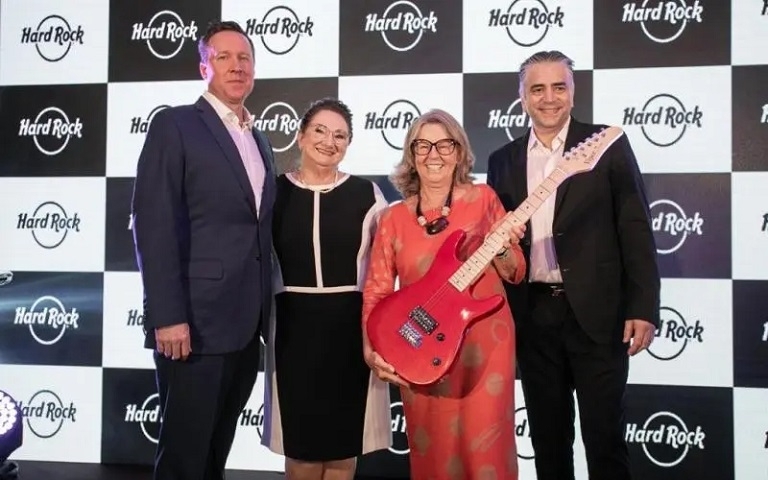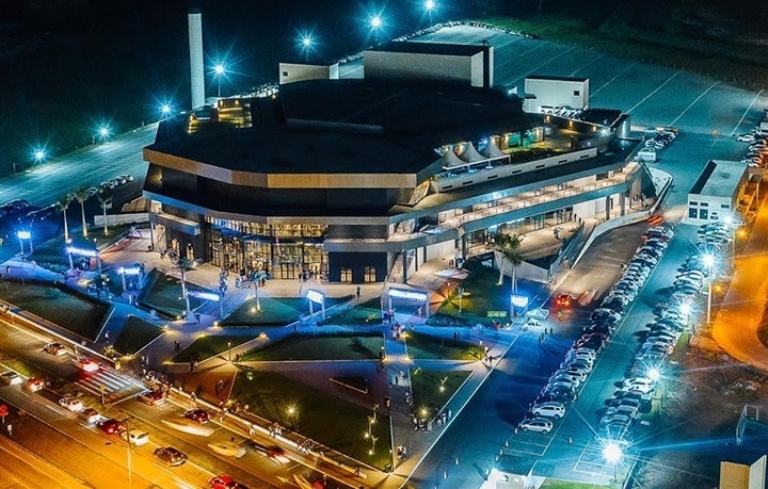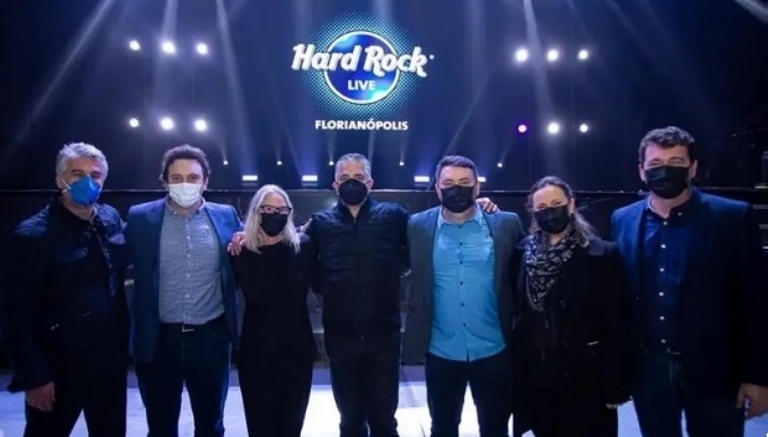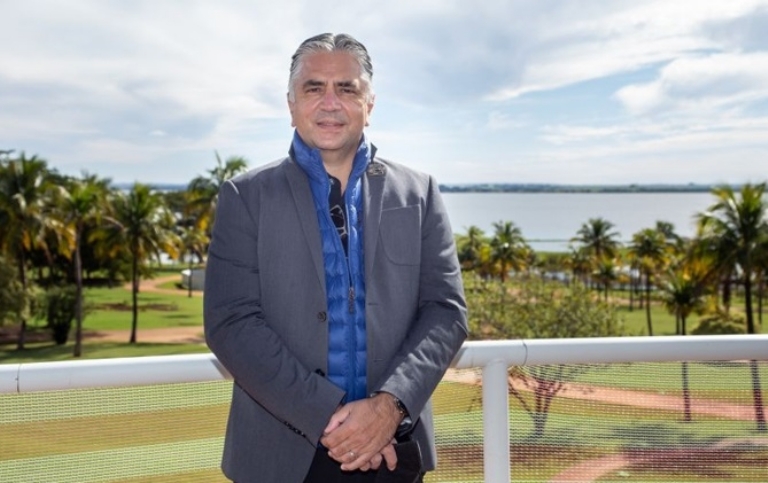

Below, some of the most relevant excerpts from the interview with Alex Pariente:
GMB - First of all, I would like to congratulate you on the recent achievement of the ‘Latin American Property of the Year’ title for the Hard Rock of Punta Cana. What does this recognition represent for one of the units that you are running?
Alex Pariente - For us it was a great emotion, mainly because the panel of judges that choose the winners by category are all industry colleagues and very prestigious, with years of experience in the industry. We are coming out of a year of unprecedented crisis around the world and still having the possibility to operate in a destination as challenging as the Caribbean, which was limited by lack of seats on planes, lack of supplies and many challenges, which normally are big on a continent, imagine on an island. This grows by 10 times. So, for me it was very important, because I know the impact that recognition had on the team, which worked hard and with a lot of sacrifices. So it was really nice to see the industry recognized this Punta Cana property and our partners in the destination. It was probably one of the things that gave me the most joy in my career because of the relevance of the post-crisis context we are living in.

Hard Rock is a brand recognized worldwide, with a history of 50 years of existence. How is the casino hotel chain currently positioned in the global gaming market?
Very good question. I would like to take this space to acknowledge the Seminole Tribe of Florida, who own Hard Rock International, and especially our Chairman Jim Allen. He had the vision, decades ago, of crossing the limits of the territory and also all the prejudices that one had with the native peoples. And they started to develop the brand internationally and taking advantage of all the business verticals we have. We started in Florida with a casino whose main activity was poker and bingo. Nowadays we have several verticals, including entertainment, in which we have Hard Rock Live and we do more than 38 thousand shows a year all over the world. We are present in 69 countries in a post-pandemic era. We have a vertical of hotels in which we have licensing and management agreements, with some other destinations that we consider key, such as Brazil. We have another business vertical which is casinos. We currently have 13 casinos in the US and are opening another one. And we are very interested in license auction processes in other destinations, both in the United States and globally, including Brazil, whose process we are following very closely.
We have another vertical that is well known around the world, which is the Hard Rock Café. And another area that is undergoing a second wave of reformulation, which is the ritter vertical, in which we have stores in different destinations promoting the brand and selling branded items. And very recently we incorporated a digital vertical, where we have the opportunity to explore the sports betting area. We already had this license in New Jersey and Atlantic City and last week it was activated in the state of Florida. So the brand has evolved in a way that is very friendly to any destination and any government. Two or three years ago I spoke with Brazilian government officials and said that the brand's commitment to the country is indisputable and has only one direction and that direction focuses on growth. We had two projects two and a half years ago and today we have 11 projects in Brazil, in different stages of development.
And what are the main actions in Brazil, which doesn't even have casinos but has, among other things, this vertical you just talked about?
It is very important for us to do and then speak. As I always told the authorities, we didn't arrive with promises, but with facts. We have different partners in Brazil. We have eight projects with one of them, which is in the area of share ownership, in a new model that we are developing with the brand in Brazil, which is the sale of homes under the shared ownership model. Of the eight projects we have with VCI, our partner in this area, seven are under the shared ownership model and another is a conventional and traditional hotel.
The destinations that we are developing with VCI – and the Chairman of the company is our dear friend Samuel Sicchierolli – range from Fortaleza, where we hope to have the possibility of opening our first hotel in the Northeast at the end of next year, heading south, to Ilha do Sol. In Fortaleza, there are 700 apartments between residences and hotel apartments, on an incredible beach. Then we go to Ilha do Sol, São Paulo, Recife, Natal, Campos do Jordão, Foz do Iguaçu and many projects. In São Paulo, we have a project on Avenida Paulista, where the former Sumitomo, an iconic building in the state of São Paulo, used to function. We also have very interesting projects in Gramado, Rio Grande do Sul, with Toctao, a very strong developer. Our friend Victor Nakamura is accompanying us in the development of this project.
And in Santa Catarina, we have a project that is one of my favorites and very interesting, with the Berger and Petry families, where we are developing a Hard Rock Live. It will be an arena for 17,000 people in the first phase, which will then be followed by a hotel vertical and then by a residential vertical. And, when the government makes use of it, whether in sports betting or physical casino modalities, eventually it is our intention to participate or take advantage of the opportunities that the government allows to develop in the country.

And do you expect these changes to happen quickly? You are already prepared, but what about Brazil, is it ready?
Brazil, for me, is a continent, not a country. So, it's an area of endless opportunity. If you check, many states in Brazil are larger than some countries in Latin America and above all in South America. So, we have to follow the evolution of the task of the political sector in Brazil to take advantage of the opportunities that are being developed. In 2019, a law was enacted that allows lottery activities and among these activities is the sports betting vertical. The federal government and the secretariat in charge of developing the regulation of the activity, led by Gustavo Guimarães who is working hard with our friend Waldir, to generate the right conditions for the evolution of the activity in a safe, sustainable and economically viable way. They have until 2022 to complete this difficult task.
Gustavo Guimarães himself has already promised that this will be ready and properly regulated even before the 2022 World Cup in Qatar...
I have no doubts. He has a team working very hard. The Ministry of Economy is also working very hard to make this happen. Brazil gave yet another sign of maturity by allowing States to self-regulate to participate in the activity. There are many states developing their own regulations according to global parameters to allow the activity to develop. So, we are following all the processes and we want the best for Brazil. We also want a very strict regulation, which takes advantage of the strength of the financial system that Brazil has to prevent all unwanted activities within the development of the entertainment area, whether for sports betting, online, physical or casinos. We are alert and following all possibilities to follow the regulations, both state and federal, so that they are adequate to allow a company of the scale of the Hard Rock to decide to take advantage and continue investing in the country.
Among your projects, is the one in Florianópolis, together with Arena Petry, the closest to the possibility of having a casino with the Hard Rock brand in Brazil?
The potential is in every project we have. It is very interesting to see what is the purpose of opening the gaming sector as a form of entertainment. So, I keep looking at what we can achieve. We are doing a very good job in Brazil to attract tourists from abroad. Brazil has an infinite treasure, which is the very active internal tourist traffic. But we need high-end customers and international tourists, both from the United States and Europe, who can arrive and enjoy the beauty that Brazil has to show, with a much higher level of consumption. We can, through private investment, help the government to foster diverse infrastructure in areas it needs to develop and tools to attract and promote a tourist destination for an overseas client.
It is very positive to use integrated resorts as one of the alternatives and this is what the government is debating, as a tool to be able to present itself in international markets with high consumption standards and attract tourists to Brazil. If what we want to do – as the Minister of Tourism always says – is to add a large flow of foreign visitors to Brazil, I think it is a viable alternative to create an infrastructure and a level of product that currently does not exist in Brazil. I think that many of our projects will be prepared if the conditions on the part of the government are adequate to be able to develop the activity.

Today, without talking about casinos, how much is Hard Rock's investment in Brazil approximately?
I prefer to talk about jobs. For example, in our Fortaleza project, we are going to employ approximately between 2 and 3 thousand people directly and indirectly. The project is a small town. It has a hotel, a residential area, very high standard houses, a duplex residential area and townhouses. All on a beach that is amazing. It's the biggest beach in the world I've ever seen, with a beauty and characteristics that anyone, anywhere in the world, would want to have. So, I think the economic value that a project of this size will produce is very important, as well as the changes in the cities and destinations where they are established.
I give just one example. So that we can exist, we are going to use more electricity in this project than the city uses. So we have to collaborate with the electricity company to reinforce and add infrastructure, in addition to collaborating with the city's mayor to beautify the destination so that when a foreign tourist decides to go out to explore the city, they find everything beautiful and the culture of the Northeast has to offer. It's a joint effort and we have to improve the infrastructure of hospitals, communication and transport and logistics. Consumption will change considerably at destination, and this is positive as it continues to generate jobs and small entrepreneurs who have to supply products that allow the activity to develop. So the impact will be very important in several áreas, and I hope you have the opportunity to accompany us to witness this.
In the case of Santa Catarina, the Arena conversion is practically ready. The challenges we face in Santa Catarina are the same as those in the United States or Europe and Asia. The post-COVID situation has led to a global shortage of products. Many products we use are imported and many others are produced in Brazil. But the logistics are still complicated. Something that took a week to receive, today it takes two months. Steel is an example, as it is difficult to get in the quantities we need, as well as other components, such as furniture and materials that we need to produce to get the hotels ready, take more time. We will follow these processes and if we have to wait a couple of weeks for the opening we do it, but we will open correctly so that the entire audience has consistency in the experience of the brand properties. God willing, by the end of the year we hope that Florianópolis will already have the Hard Rock flag above it and we are counting the days to open our hotel in Fortaleza.

We are looking forward to it too. From the point of view of casinos, how do other players in the market see Brazil and report to you, as one of the great authorities in the sector, to find out how things are going in relation to the law in Brazil? How do players see all of this?
It's a very interesting question. Brazil is a continent, with incredible economic power and I think it is one of the most anticipated destinations by everyone in terms of expectations about how the regulatory process of both physical casinos and sports betting, lotteries etc. will be carried out to enable what is organized in virtually the entire world. The expectation is very high and very cautiously. I am always positive and optimistic, not only because I have been working in Brazil for many years, with great friends and properties. So for me there has always been this connection. Expectations are great and precautionary.
Nowadays, especially in this post-pandemic period, many destinations that did not have gaming entertainment as a regulated form, are incorporating and opening up the activity. Then it becomes a competition of capital and market. There are not many companies that have the size and financial assets that can make a a project of the level that Brazil needs. And the destinations that are opening up gambling as a form of cool entertainment are many. So, those destinations with firmer legislation that can provide legal support and that sound financially viable will be those where the capital of private companies will prioritize. From the perspective of Brazil, we have many positive things. We are foreign exchange exporters, because our friends in the country go to the best hotels around the world and the best casinos in the world to enjoy entertainment and gaming. So we are foreign exchange exporters.
I think the power of the Brazilian people and the inclination to consume this activity is very clear around the world. Today we see clients from Brazil who go to Asia and the United States (Florida and Las Vegas). So it's a desired and developed activity for everyone. What we need to do for clients from abroad to arrive in Brazil as Brazilians arrive at all gambling destinations is to be able to offer legal certainty and very clear and firm regulation, supported by an important basis that Brazil has, which is the regulation of the system financial. Brazil has the best regulations in the world in the area of money laundering prevention and tracking of the origin of funds regarding the money circulating in banks. So, we have a very strong tool that can safely support the activity, protecting the industry from latent risks that are similar to those that the financial industry has. We have the hardest part and in many destinations that are trying to develop casino and sports betting activities, banking regulations are not as strong [as in Brazil] and this is a problem for the industry as we want a lot of control and a qualification process very fair, but very strict, that only allow companies that have a very strong financial state to be able to develop the investments that the country needs. And also to develop strategic associations with local companies, which know the market and are operating in a formal and organized manner, and make the industry to be created based on the legislation in Brazil even stronger.
So, everyone has a lot of expectations and is following the process. Much will depend on the regulation and qualification process, both of companies and executives, to ensure that the industry can function in a similar way to the most developed markets in the world. I am very positive about our legislators and also on the private side, with our partners in Brazil, so that we can have good regulation.
Source: Exclusive GMB